Health and
Virtual Care

Improve the overall health and wellness of your organization with a single, modern platform.
We drive real member outcomes through virtual care and Humanized Healthcare.
Improve productivity, reduce absenteeism, and build a culture of happiness and well-being.
Essential wellness services to stay happy and healthy, in one digital-first platform.
Flexible, integrated, and personalized mental health care, backed by science.
A complete member journey accessible from our industry-leading virtual care platform.
Empower all of your members to proactively adopt healthy habits.
Calculate your return on investment with Dialogue's wellness calculator.
Learn why you need to invest in your employees’ well-being,and how Dialogue can help you get there.
In the second edition, we explore how factors like financial stress impact Canadians’ overall well-being.
Discover how we can help drive positive outcomes for your organization.
Elevating Canadians’ healthcare expectations, together.
Members can expect a better experience compared to traditional employee benefits and care.
Recognizing Canada’s top organizations leading the way in employee health and well-being.
High-quality, virtual benefits for your employees aren’t an expense - but an investment
Explore the positive impact of Dialogue's virtual care.
Learn how Dialogue is reinventing the EAP experience.
Dialogue is the leading health and wellness provider in Canada.
Discover the latest news, content and reports for HR leaders.
Learn more about health, organizational well-being, and life at Dialogue!
Learn how we improve the health and wellness of our clients.
 Newsletter
Newsletter
Stay a step ahead on employee benefits, wellness, and productivity news and resources.
Webinar: Learn how to strengthen your EAP offering and better support your team, based on insights from the report.
Data-driven insights on employee well-being, and how you can make informed decisions for your organization’s EAP.
Discover the organizations that lead the way in employee well-being.

This annual report is published by Environics Research following a Canada-wide survey, conducted to understand Canadians’ attitudes toward health and virtual care. The research was sponsored by Dialogue; however, the sponsor of the research was not shared with respondents, ensuring unbiased data collection.
The 2021 survey was completed by 1,760 Canadians – representing all age groups and all provinces (except Nunavut, Northwest Territories and Yukon Territories) – between September 8 and 22, 2021.
This is the second consecutive year this survey has been fielded; conducted with the intention of measuring changes in Canadians’ attitudes over the past year, while also understanding the evolving health landscape in Canada.
Impact on Employers and Organizations
Your Role as a Leader
Opportunities for Your Organization
Solution You Can Provide
Impact on Employers and Organizations
Your Role as a Leader
Opportunities for Your Organization
Solution You Can Provide

Canadians report worsened health and mental health due to the pandemic. As a result, many have become more conscious of their health and are willing to do more to protect it – and many hope to take better care of themselves through their employee benefit plan.
Fast, convenient access to healthcare remains a frustration, with Canadians now more likely to report that COVID-19 has made it difficult to access healthcare.
Virtual care (healthcare, stress and mental health, legal and financial help, counselling and more provided remotely via audio, video and other technologies) is a potential solution to help Canadians manage their health and mental wellness, and access timely support. The majority of working Canadians continue to expect employers to include such offerings as part of their employee benefit plans. Employers need to choose virtual care services carefully, matching the expectations of their employees. Employers also need to choose providers that make it easy for employees to understand their benefits, and where and how to access them – a lack of due diligence in ensuring employee understanding may be perceived as a lack of commitment to corporate wellness.
%201.png)
The COVID-19 pandemic continues to be a part of life for many Canadians. Its impact on how they view their health and wellness is long-lasting, with many being more conscious than ever about health and wellness.
A quarter (25%) of Canadians indicate that the pandemic has worsened their overall health, with almost half (45%) indicating that their mental health (e.g., stress, anxiety, etc.) has worsened due to the pandemic. Additionally, approximately three in ten report worsened sleep (31%) and levels of physical activity (36%). These worsening conditions brought on by the pandemic can have negative impacts on employee wellness, which can lead to absenteeism and lower productivity in the workplace.
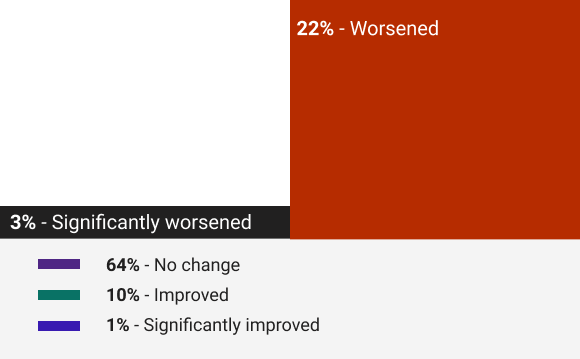
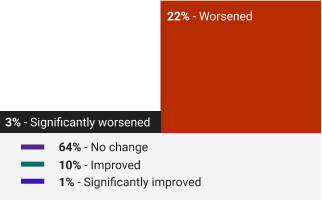
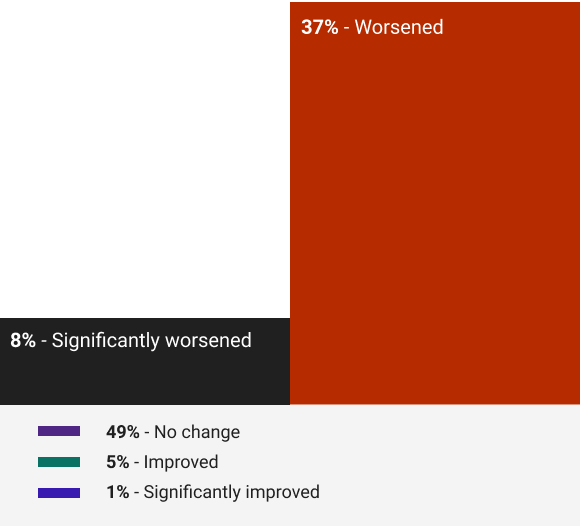
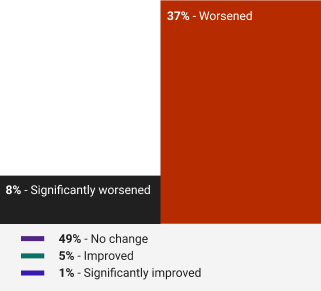

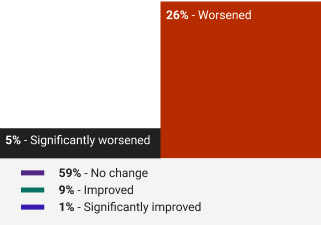
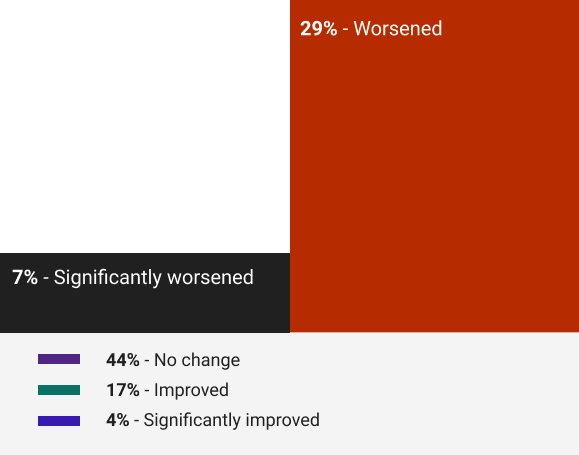
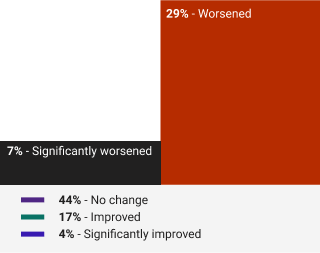
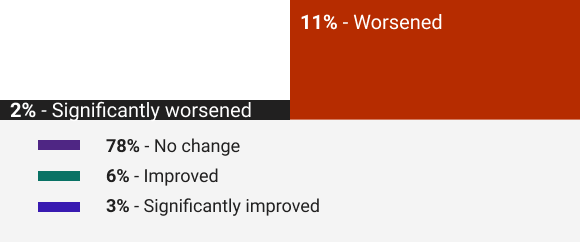
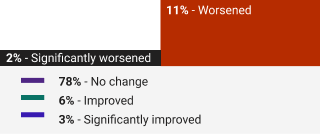
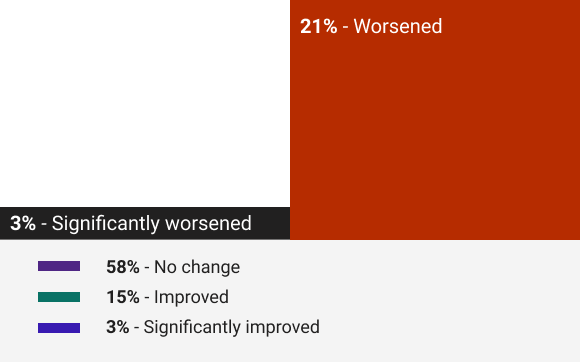
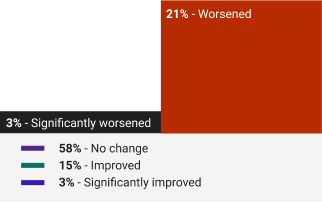
This has led to Canadians being more conscious of their health (56%) than before the pandemic and wanting to take better care of themselves (82%) – suggesting that tools, resources and access to health benefits will be welcome. Already, 39% of those who want to take better care of themselves plan on using their employee benefits to help them translate their new-found health and wellness consciousness into action.
The Canadian healthcare system is designed to provide universal access and high-quality care across the country; however, the system is not always easy or convenient to navigate, with the pandemic exposing some of these shortfalls.
%202.png)
Compared to 2020, Canadians are now more likely to report that the pandemic has made it more difficult to access healthcare (statistically significantly more, 2021: 50% vs. 2020: 46%). With healthcare already being a challenge to access, and the pandemic adding to the strain on the healthcare system, many Canadians may choose to delay accessing healthcare when necessary – or may not access it altogether – leading to further negative impacts on health, wellness and the healthcare system.

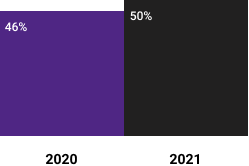
With almost half of Canadians reporting worsened mental health (e.g., stress, anxiety, etc.) related to the pandemic, and being more conscious of their well-being, maintaining good mental health and wellness will be a priority for many.
Currently, many Canadians (39%) accessing mental health support had to wait eight days or more before accessing the support they needed. This reality is starkly different from expectation, as half (52%) believe that, ideally, they should be getting the mental health support they need the same day they seek it.
Mental health support does not always have to take the traditional form of communicating with a mental health professional, as 73% of Canadians would be likely to use self-led resources and tools to guide them through their needs. This compares with 81% who would be likely to talk to a mental health professional.
39%
42%
15%
4%
25%
48%
21%
6%

Employee benefit plans often provide access to healthcare and mental health support; however, there is a lack of awareness of what is available – and what is available is not always sufficient.
Two in ten Canadians with employee benefit plans are not aware of the benefits available to them; and a quarter (26%) don’t know how to access the benefits available to them (e.g., via an app, a toll-free number, etc.).
Additionally, 32% of Canadians with employee benefit plans indicate not having, or not being aware of, an Employee Assistance Program (EAP – legal, family, career counselling, mental health support, and more). Among those who have access to an Employee Assistance Program, almost six in ten (57%) have never accessed it.
These gaps suggest that employers may need to adapt their efforts to educate employees on benefit plans, Employee Assistance Programs and their benefits, while ensuring that these resources are easily accessible. One way to achieve easy access is through a mobile or web app, which would be preferred over a 1-800 number (60% prefer a mobile or web app) when accessing an employee benefit plan or Employee Assistance Program.
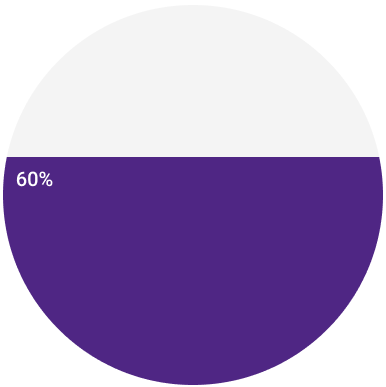
When it comes to mental health support, a quarter of Canadians (24%) with benefit plans indicate that the mental health support available in their benefit plan is not sufficient. A further 16% indicate not having mental health support available through their benefit plan, and 17% are not aware of their benefit plan’s mental health resources. This suggests that there’s an opportunity to review how mental health support is provided through benefit plans, making sure it’s sufficient, and that employees need to be educated about the supports that are available to them.
How can employers and organizations make a difference? How can they show commitment to corporate wellness and improve access, especially given the toll COVID-19 has taken on the health and mental health of Canadians? Seven in ten Canadians continue to agree that “virtual care represents the future of healthcare”. As in 2020, most also maintain that access to virtual care can help Canadians reduce the number of hours they spend away from work or school, and allow them to be more proactive about their health and mental health – all while avoiding sitting in a waiting room at an in-person clinic. This suggests that Canadians believe virtual care isn’t a pandemic-related trend or need, rather they see the long-term benefits virtual care can offer them and their families in maintaining health and productivity.
16%
50%
24%
9%
26%
56%
14%
5%
17%
51%
25%
7%
19%
54%
21%
6%
26%
38%
28%
9%
Canadians’ belief that virtual care is the future of healthcare also suggests that the public is increasingly comfortable with it, a sentiment that can be measured by observing their decreasing concerns. Compared to 2020, fewer Canadians are now concerned about the following:
A common concern with virtual care is privacy and this also seems to be subsiding. Only 49% of Canadians are now concerned about privacy, down from 58% in 2020. Moreover, in a similar survey conducted with Canadians who have used Dialogue’s services, it was found that those who’ve had experience with Dialogue’s virtual care platform had fewer privacy concerns (27%) than Canadians who have no experience with Dialogue – suggesting that, as Canadians continue to gain experience with well-established virtual care platforms, privacy concerns will continue to ease.
Positive experiences with virtual care can also lead to comfort with using online platforms for other services, such as mental health and wellness, physical training, Employee Assistance Programs, sleep issues, etc. This is evidenced by noted differences among those who have experience with virtual care (Dialogue members), who are more willing to use online platforms for other services, and general Canadians:
(e.g., fitness, yoga)


(e.g., consulting with a therapist)


(e.g., legal, family, career counselling, mental health support, etc.)


(e.g., mindfulness, meditation)


(e.g., consulting with a doctor)

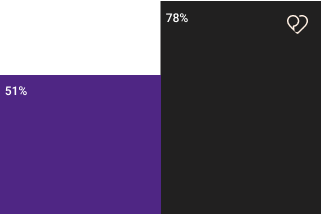

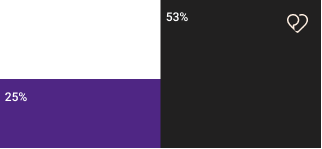
%202.png)
Most Canadians’ experience with virtual care is limited to telephone appointments with healthcare professionals, with 52% having had a telephone appointment with a family doctor or clinic. However, we know this is not an optimal virtual care experience rooted in best practices (as indicated by the Canadian Medical Association Virtual Care Playbook for physicians) and creating a positive experience with virtual care will be critical to uptake. There are a few things Canadians expect when accessing virtual care.
82% of working Canadians agree that employers should provide virtual care services for their employees.
Accessibility, through benefit plans, continues to be among Canadians’ most important considerations when considering a virtual care platform. A majority (86%) continue to say they would not be willing to pay out-of-pocket for virtual care. However, most working Canadians (82%) agree that employers should provide virtual care services for their employees, and six in ten maintain that they would be likely to use virtual care if it was available through their benefit plan; and a similar proportion would use an online platform to access a mental health professional.
Canadians continue to have high expectations of virtual care – meaning that employers considering virtual care solutions for their employees should choose platforms that meet their preferred criteria.
59%
37%
3%
1%
50%
43%
6%
1%
44%
46%
8%
2%
44%
46%
8%
2%
37%
51%
10%
2%
51%
37%
8%
4%
39%
46%
12%
3%
34%
49%
15%
2%

With Canadians reporting worsened health and half reporting worsened mental health due to the pandemic, the potential negative impact on employers can be significant, translating to lost productivity, absenteeism, and unmotivated employees.
In addition, difficulties in accessing healthcare and mental health support will worsen the issue.

Employers in Canada recognize that the good health and mental wellness of their workers leads to a productive and successful work environment. To ensure that employees remain healthy and productive, leading employers must prioritize corporate wellness, and take proactive steps to support their employees’ overall physical and mental health.
Employers must ensure that employees and their families have access to the support they need
and understand how to access these resources.
32% of Canadians with employee benefit plans indicate not having, or not being aware of, an Employee Assistance Program.
24% of those with employee benefit plans indicate that the mental health support is not sufficient.
8 in 10 agree that virtual care can help them avoid missing work (or school).
7 in 10 agree that virtual care can allow them to be more proactive about their and their family’s health and mental health.


Virtual care continues to be a long-term solution – an approach that Canadians are getting more comfortable with, indicating that it is a well-received approach to accessing healthcare that will be utilized post-pandemic.
Virtual care is not just a solution to healthcare during the pandemic; its benefits are far-reaching, and the pandemic has simply sped up its adoption and acceptance. Having easy access to care when needed will always be important, it allows Canadians to take control of their own health and mental well-being.

Canadians would like to see their employers provide virtual care services, as well as additional mental health support, as part of their benefit plans. They report that, if such services and resources were available through employee benefit plans, they would be likely to use them.
For employers seeking to promote corporate wellness – and build healthy, productive teams and competitive benefits packages – virtual care and providing online access to other employee benefits may help achieve this.
Environics Research delivers evidence-based solutions to clients working in a range of sectors and industries. Our team is drawn from many disciplines – from business and marketing, to sociology and urban affairs. This mix makes Environics a creative and intellectually vibrant research and consulting firm, where methodological rigour and unrivaled analytical capabilities come together. Our experience, our people and our sophisticated tool kit help our clients get answers to their most important questions.
Today, Environics' international clients include a number of the world's largest consumer marketers. In Canada, most of the country's governments, many leading non-profit entities, and businesses working in a range of industries (including financial services, telecommunications, natural resources, print and broadcast media, healthcare and pharmaceuticals, and packaged goods) trust Environics to develop actionable insights that inform evidence-based decision-making.
Environics has an extensive record of conducting health-related research, and of delivering evidence and insight to inform public health strategies and health policies at the provincial and federal levels.
Headquartered in Toronto, we employ more than 50 staff across Toronto, Montreal and Ottawa.
For more information about Environics Research or questions about this report, please contact: